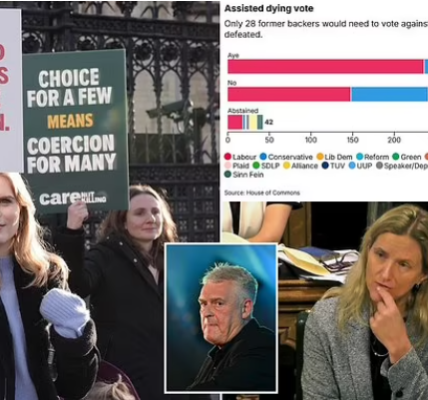Farmers plot co-ordinated ‘sewage strike’ as part of militant action over Labour inheritance tax raid_Nhy
Farmers are plotting a co-ordinated ‘sewage strike’ as widespread anger grows into militant action over Labour‘s inheritance tax raid.
President of the National Farmers’ Union (NFU) Tom Bradshaw said anger among farmers is ‘like I’ve never experienced before’ and said ‘many’ are considering drastic action.
It comes amid fears Britain could be brought to a standstill as farmers emulate their Dutch counterparts and stage nationwide protests, with a rally planned in London later this month.
British farmers are reportedly plotting a co-ordinated ‘sewage strike’ which would see them stop spreading sludge and biosolids – remains of human waste after liquid has been removed.
Experts say this could cause chaos for sewage and water companies as farmers in the UK take about 3.6 million tonnes of sewage sludge from water treatment plants and spread it on agricultural land.
Withdrawing this effective way to get rid of sewage waste would force bosses to suddenly find somewhere new to dumps millions of tonnes of sewage.

Farmers demonstrated in London in March over food security fears – and it is feared they could do so again

Concerns over new EU environmental legislation led to months of protests in which farmers blocked major roads and highways with queues of tractors (Pictured: protests in Brussels)

Dutch farmers used tractors and trailers to block major roads including highways and set fires to disrupt traffic
One Dartmoor farmer told the Telegraph: ‘If you truly want to be seen to put your children’s futures first, then now this week is the time to phone your sludge supplier [and] put a temporary halt on all deliveries.
‘If enough of you do this, we have a reasonable chance of changing government policy. If you don’t, we have no hope at all and will only have ourselves to blame. Let’s see who deserves recognition for doing something unselfish for the greater good of all.’
It has sparked concerns the UK could soon follow in the footsteps of the Netherlands which saw disruptive protests across the country earlier this year, and stop spreading sludge on their land.
Dutch farmers used tractors and trailers to block major roads including highways and set fires to disrupt traffic.
They also used dozens of tractors to block the Dutch-Belgian motorway border crossing between Maastricht and Liege.

Dutch and Belgian farmers protest on the highway near Arendonk, near the border with the Netherlands

There are fears protests in the UK could mirror scenes seen in the Netherlands earlier this year (pictured)
Now the NFU has raised the prospect of similar action in the UK following Rachel Reeves announcing an end to the exemption on inheritance tax for farmers, with a new 20 percent levy to be imposed on farm assets above £1 million from April 2026.
Farmers have been left outraged by the change, which they say will put an end to family farms by forcing their children to sell land in order to pay hefty tax bills.
The Treasury has claimed that in effect farms worth up to £3 million will be exempt from the tax, but the NFU – basing its claims on Department for Environment, Food and Rural Affairs (DEFRA) figures – dispute this.
Farmers are expected to protest at Westminster on November 19 against the plans.
Asked about the threat of ‘militant’ action, a government spokesperson said: ‘We understand the concerns people in the farming community have… but when you look at data 73 percent of claimants will not be affected.’
When pressed, the spokesperson: ‘The changes that the Chancellor announced at the Budget they will happen.’
Mr Bradshaw said: ‘We’ve got many people — and we do not support this — talking about militant action.
‘This is the only way they think their voices are going to be heard. And I think that just demonstrates the strength of feeling that there is bubbling up around all four corners of the UK.
‘We’ve done everything in the past to say, ‘Don’t protest’. Today, I’m not in a position where I can say to people they’ve got no reason to do that.’

There are fears fresh protests or blockades could bring vital parts of the UK’s food industry to a standstill

After Rachel Reeves’ (pictured) Budget, the government was warned the new measures could stop an entire generation from farming
The government expects the new tax rules to raise an extra half a billion pounds by 2028/9.
The Treasury says just 27 percent of farms will be affected, but the NFU says the true figure, based on analysis of DEFRA figures, is 66 percent.
The new rules mean farmers can pass on £1 million of agricultural assets tax-free, in addition to exemptions for all inheritances – a £325,000 tax-free allowance, plus a further £175,000 for a main residence.
The Treasury argues this means most farmers can use all three and pass on £1.5 million of assets without tax – and if the farm is owned by a married couple, both are eligible for the exemptions. This would enable them to jointly pass on £3 million of assets.
The government also pointed out that farmers who pass on the farm seven years before their death will not leave their heirs facing any inheritance tax.
But Mr Bradshaw, who met with government representatives on Monday, says farmers are still furious.
He held an urgent meeting with Environment Secretary Steve Reed and Treasury minister James Murray to discuss the policy.
It raises concerns the UK could see widescale protests and strikes by farmers, potentially bringing the country to a standstill and threatening food security.
Similar action by farmers across Europe over the last few years caused massive disruption, especially in the Netherlands, France and Brussels.

Farmers drive slowly through central London in protests on food security in March
Concerns over new EU environmental legislation led to months of protests in which farmers blocked major roads and highways with queues of tractors.
They also blockaded the streets around the EU Parliament in Brussels, spraying manure over the roads.
Farmers eventually won concessions including the scrapping of planned new pesticide legislation and extra protections for nature.
In the UK, hundreds of farmers are expected to protest outside Parliament later this month, much like they did in March, when many drove their tractors to Westminster to highlight the lack of support for UK food production.
A government representative said: ‘The government’s commitment to our farmers remains steadfast. It’s why we have committed £5 billion to the farming budget over two years – more money than ever for sustainable food production.
‘We understand concerns about changes to Agricultural Property Relief and the Defra Secretary of State and Exchequer Secretary to the Treasury met with NFU President Tom Bradshaw today.
‘Ministers made clear that the vast majority of those claiming relief will not be affected by these changes. They will be able to pass the family farm down to their children just as previous generations have always done.
‘This is a fair and balanced approach that protects the family farm while also fixing the public services that we all rely on. We remain committed to working with the NFU and listening to farmers.’
Asked to comment on the prospect of mass ‘militant’ protest, the NFU provided further comment from Mr Bradshaw.
He said: ‘Farmers and growers have been left reeling from the changes announced in the budget which demonstrate a fundamental lack of understanding of how the British farming sector is shaped and managed. The current plans to change APR and BPR need to be overturned and fast.
‘Farmers are rightly angry and concerned about their future and the future of their family farms, having been reassured by minsters in the lead up to the Budget that APR and BPR changes were not on the table.
‘The Treasury’s figures which claim this will only affect one in four British farms are misleading. The £1 million cap to APR shows how little this government understands the sector.
‘Very few viable farms would be worth under £1m, but lots of smallholdings and houses with a few acres let for grazing might be. The asset value of genuine food-producing farms will be high, given the size they need to be to remain viable businesses; but that’s the value of the asset, it doesn’t reflect its profitability which is often, and increasingly so, very low.
‘Clearly the government does not understand that family farms are not only small farms, and that just because a farm is an asset, it doesn’t mean those who work it are wealthy. Every penny the Chancellor saves from this will come directly from the next generation having to break up their family farm. It simply mustn’t happen.
‘MPs need to understand the consequences of these actions which is why we are mobilising our members for a mass lobby in the coming weeks. British farmers will ask their MPs to look them in the eye and tell them whether they support this.
‘There’s still time for the government to accept they’ve got this wrong, and my message to ministers is that they should do the right thing and reverse this awful family farm tax.’


